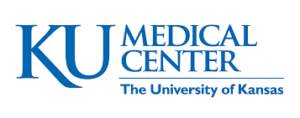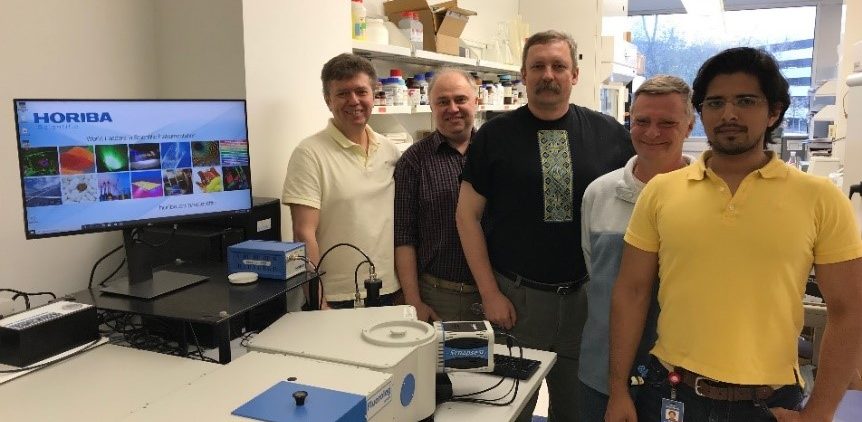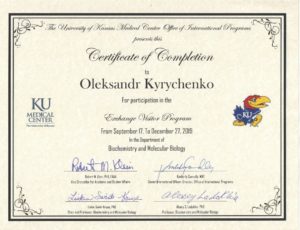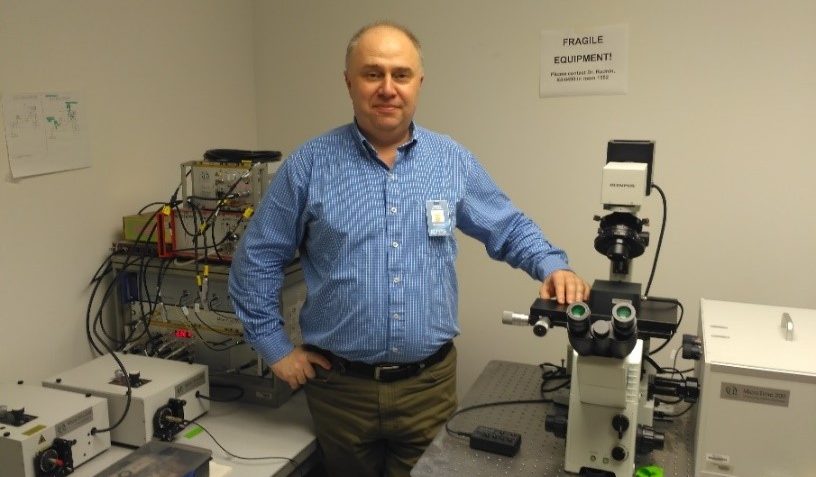 It is my pleasure to acknowledge the US-Ukraine Foundation Biotech Initiative for the 2019 travel grant award. The financial support from the US-Ukraine Foundation allowed me to visit the University of Kansas Medical Center, Kansas City, U.S.A. I spent four months of scientific training in the laboratory of Prof. Alexey S. Ladokhin at the Department of Biochemistry and Molecular Biology starting from September until December 2019.
It is my pleasure to acknowledge the US-Ukraine Foundation Biotech Initiative for the 2019 travel grant award. The financial support from the US-Ukraine Foundation allowed me to visit the University of Kansas Medical Center, Kansas City, U.S.A. I spent four months of scientific training in the laboratory of Prof. Alexey S. Ladokhin at the Department of Biochemistry and Molecular Biology starting from September until December 2019.
Primary research interests of the laboratory are focused on studying protein-lipid interactions by using a battery of spectroscopic techniques, such as steady-state and time-resolved fluorescence, depth-dependent fluorescence quenching, Forster Resonance Energy Transfer (FRET), single-molecule fluorescence correlation spectroscopy (FCS, sm-FRET), confocal fluorescence imaging complemented with molecular dynamics (MD) simulations.
My working project was devoted to studying lipid membrane interactions of apoptotic proteins of Bcl-2 family, which are crucial for proper development and function of cell populations in tissues, and its dysregulation affects many diseases. Hyperactive apoptosis contributes to neurodegeneration and immunodeficiency, while insufficient apoptosis leads to autoimmunity and cancer, and the ability of cancer cells to avoid apoptosis significantly complicates treatment. The critical step in triggering apoptosis is the permeabilization of the mitochondrial outer membrane (MOMP), which releases apoptotic factors into the cytosol that lead to cell death. The project goal is to understand molecular mechanisms of membrane-induced conformational switching in Bcl-2 proteins in regulation of apoptosis.
During my visit, I participated in the workshop from HORIBA (New Jersey, U.S.A.) Fluorolog-3 fluorescence spectrometer installation and operation training. The latest generation Fluorolog-3 spectrometer is equipped with the T-side optics and high CCD speed multi-channel detection from UV-vis up to NIR ranges.

The workshop group photo: HORIBA service engineer Jack Sawiski, The lab members: Dr. A. Kyrychenko, Prof. A. Ladokhin, Dr. M. Rodnin, Mr. V. Vasquez-Montes.
During my visit, I studied depth-dependent fluorescence quenching of fluorescent-labeled proteins by using a spin-labeled Tempo-PC lipid quencher. The characterization of the behavior of lipid-attached spin probes in a bilayer is of fundamental importance for the correct interpretation of the results of both EPR and fluorescence studies of protein-membrane interactions. The knowledge of the immersion depth of TEMPO spin probe attached to lipid head-group in TEMPO-PC is critical for the determination of the transverse location of fluorescence probes attached to proteins and peptides. The results of this study have been submitted and already accepted for publication in the Journal of Membrane Biology. The publication: “Alexander Kyrychenko, Alexey S. Ladokhin. Location of TEMPO‑PC in Lipid Bilayers: Implications for Fluorescence Quenching is scheduled for the upcoming issue in January 2020.
 The results of depth-dependent fluorescence quenching with spin-labeled lipid quenchers will also be presented at 64th Annual Meeting of the Biophysical Society, which will be held February 15-19, 2020 in San Diego, California, U.S.A. (the presentation title “Accurate determination of membrane penetration of proteins using fluorescence quenching and molecular dynamics simulations”).
The results of depth-dependent fluorescence quenching with spin-labeled lipid quenchers will also be presented at 64th Annual Meeting of the Biophysical Society, which will be held February 15-19, 2020 in San Diego, California, U.S.A. (the presentation title “Accurate determination of membrane penetration of proteins using fluorescence quenching and molecular dynamics simulations”).
I appreciate the US-Ukraine Foundation Biotech Initiative for the opportunity to participate in the training and research in the University of Kansas Medical Center. I believe that such opportunity will strengthen the scientific collaboration between Ukraine and U.S.A. and help for the exchange of new knowledge and ideas.
- Oleksandr Kyrychenko, PhD, Senior Research Associate, Department of Physical-Organic Chemistry, Institute of Chemistry, V.N. Karazin Kharkiv National University

